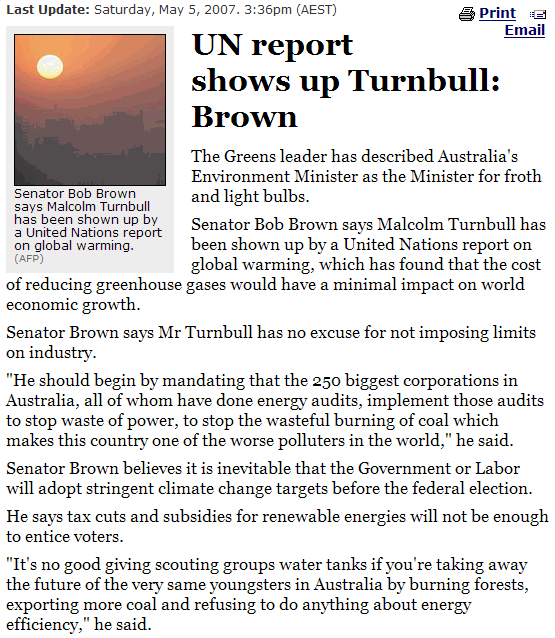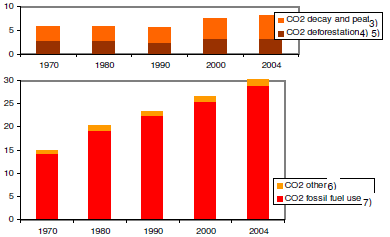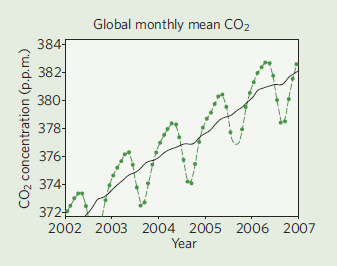|
AM - Saturday, 5
May , 2007 08:08:07
Reporter: Malcolm Turnbull
ELIZABETH JACKSON: Joining us now is the Federal Minister for Water
Resources and the Environment, Malcolm Turnbull.
(to Malcolm Turnbull) Minister, this report has blown your Government's
economic argument, hasn't it? The cost of stabilising carbon emissions is
minimal, calculated at less than 0.1 per cent of the world's GDP.
MALCOLM TURNBULL: What it's done is confirm that our policies are correct.
And I hate to say this, but you have completely misrepresented what the
Government is saying. And I refer you, your listeners, to the speech I
gave to the National Press Club on climate change - "What Next After
Kyoto?" - which is on my website, malcolmturnbull.com.au.
And you will see that the five points that I set out there as our climate
change strategy are entirely consistent with the IPCC report on
mitigation, released yesterday. And I welcome that report, I'm very
familiar with it, and it is quite consistent. In fact, if you…
ELIZABETH JACKSON: Well, one thing that's not so consistent, though, the
report says very clearly that we need a 50 to 85 per cent reduction in
emissions by 2050. Why won't your Government set those targets?
MALCOLM TURNBULL: You can't set targets on… well, let me put it this way,
the real issue is not the global target, and I said in my speech to the
Press Club, we need, in the course of this century, a very substantial
reduction in the level of the world's greenhouse gas emissions.
The problem with Labor's policy is that they say we should have a 60 per
cent cut in emissions by 2050, regardless of what any other country does.
Now, if you look at Chapter 11 of the IPCC report that we're talking
about, and it's on their website, you will see that they discuss the way
in which if you have an increase in fossil fuel prices, an increase in
carbon prices in one country, but not in others, you will get what they
call carbon leakage. And this is the point that I made in my speech, that
if you put a heavy price on Australia's energy intensive industries, those
industries will move offshore, and the emissions with them. And therefore…
ELIZABETH JACKSON: Minister…
MALCOLM TURNBULL: Let me finish. Therefore, there'll be no benefit to the
world. And it's very significant that when you interviewed Mr Garrett a
moment ago and he was asked a very clear question - will these cuts lead
to massive job losses - he did not answer that question, because he knows
they will.
ELIZABETH JACKSON: The report sets out a very clear equation, it says we
need to cap carbon emissions at between 449 and 490 parts per million, and
that that would result in a two degree increase in temperature. Do you
accept the need to set those goals, and, if not, are you prepared to
accept a greater rise in temperature?
MALCOLM TURNBULL: I accept, and I said, and I again I'd refer your
listeners to my speech, which is on my website, I accept the need, and the
Government accepts the need and is committed to a very substantial, you
could say a massive cut in global greenhouse gas emissions in the course
of this century. But it has to be global.
And this is the key point that is being missed, it has to be global, and
that's of course what the IPCC report says. There is nothing in there that
isn't consistent with our policy. And your listeners that download it from
the internet, if they go to page 10 of the "Summary for Policymakers",
they will see a list of measures for early action.
One of the points I've made repeatedly is we have to act, we have to act
now.
There's a lot of technological developments in relation to solar and in
relation to renewables, hot rocks, clean coal, which are some years away.
But if you look at the things that they say we should be doing now, they
are all things which Australia is leading the world in. Energy efficiency
- we're the first country to phase out incandescent lights; forestry use,
you know, stopping deforestation.
We, we…
ELIZABETH JACKSON: Minister, we do, we do…
MALCOLM TURNBULL: We are leading the world in a campaign to reduce
deforestation.
Now, I just have to say many countries envy our record on greenhouse.
Canada is missing its greenhouse… its Kyoto target will miss it by over 40
per cent. We are going to…
ELIZABETH JACKSON: Minister, we do have to leave it there. I'm sorry, but
we are out of time. Thank you very much for joining us on Saturday AM.
MALCOLM TURNBULL: Yes, thank you. |

 |
![]()
![]() on Saturday.
on Saturday.
